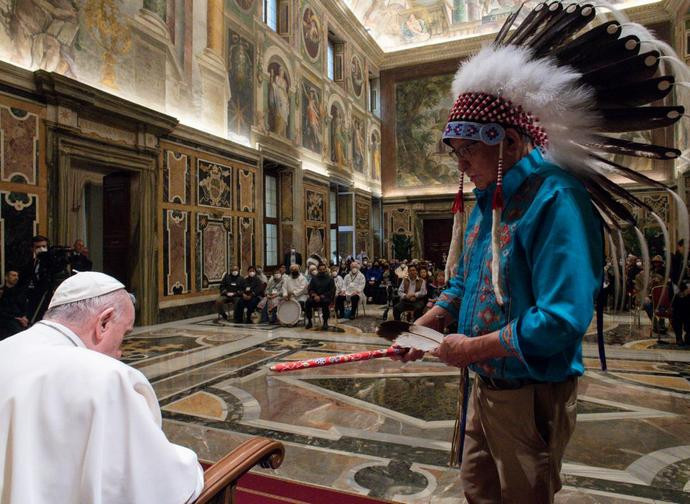"Doctrine of Discovery": No, not all cultures are equal
The recent Vatican document condemning the 'Doctrine of Discovery' is decidedly problematic because of its consequences in judging the evangelisation of indigenous peoples. Above all, it contradicts the magisterium of John Paul II and Benedict XVI on the relationship between Church and culture.

A Joint Statement was published on 30 March by the Dicasteries for Culture and Education and for Promoting Integral Human Development on the “Doctrine of Discovery”, on the violence exercised against indigenous people through the expropriation of their lands, the elimination of their cultures, and the denial of their rights.
The brief document focuses above all on the so-called 'doctrine of discovery', according to which 19th century jurisprudence legitimised the expropriation of lands inhabited by the indigenous peoples by the power that discovered them, but it cannot avoid touching, directly or otherwise, on the entire framework of the evangelisation of the new lands, especially American ones, condemning colonial and assimilation policies and specifying that the 'doctrine of discovery' “is not part of the teaching of the Catholic Church”.
To touch on such a complex issue in a single point and to throw, like a stone into the pond, accusations, however veiled, on such sensitive topics contains the danger of leaving out something important with the consequent accusation of partiality. I believe that this is also the case with the document in question, also because its intent seems to be mainly pastoral, aimed at promoting an attitude of the Church marked by "listening to the indigenous peoples" and accompanying them, with the danger of an implicit condemnation of the past without appeal.
Among the various aspects of the document in need of clarification, I would like to dwell here on the idea that all cultures are equal and none can claim to be superior to the others. The document expresses this concept in the words of Francis: “Never again can the Christian community allow itself to be infected by the idea that one culture is superior to the others”.
John Paul II had taught us, ever since his speech to UNESCO as soon as he was elected pope, that cultures are different paths that lead to human nature. With this he gave a natural criterion - human nature - to evaluate cultures both in their totality and on individual aspects of them. Thus there may be cultures that do not reflect the requirements of human nature and on individual points may be considered backward compared to others that do. It is impossible, given the fallen state of humanity, for one culture to completely reflect all the demands of human nature to such an extent that it can be considered 'superior' to others in this respect. But it is also possible that one culture can provide the others with something they do not have, and that this should not be classified as assimilationism or cultural colonialism. This must be admitted precisely in order to properly ground the dialogue between cultures.
John Paul II also taught us that the culture of a nation is born from the answer to the main problem, the problem of God. This means that on the basis of the answer given to this problem, cultures differ because they respond in more or less adequate forms to the nature of God. While this perspective assigns great importance to religions as matrices of culture, it does not consider all cultures with a religious matrix to be the same. Here, the criterion of human nature is added to that of the answer to the God problem, which in turn also affects the previous one: what human nature consists of depends on who God is. An atheistic culture cannot be put on the same level as a theistic culture, and a pagan culture on the same level as a culture that has a transcendent and personal vision of God at its basis.
The question of cultures is of great importance for their relationship with Christianity. If all cultures are equal, then, as the document we are examining says, one must simply respect them. From this perspective, one must deny that the Catholic Church is also a culture, one must deny that this culture has a function of 'purifying' cultures, and one must deny that in primitive cultures there are elements to be purified. Since traditionally these elements guided the ‘inculturation’ of Christianity, one must change this concept and transform it into the form of welcome and accompaniment.
However, Ratzinger/Benedict XVI repeatedly stated that the Church's culture is also a culture and the Christian must know that by entering it, he enters a culture, since the Body of Christ in history cannot be without it. He then recalled that the cultures of indigenous peoples were filled with beliefs and practices that enslaved man and that the task of Christianity was to "purify" them by freeing them from these horrors. Finally, Benedict XVI said that inculturation did not mean taking indigenous cultures as they are and thinking to find in them insights to revise the Christian faith.
Besides, it is precisely the evangelisation of the Americas [see here] that shows that cultures are not all the same. There is a big difference between the evangelisation of Latin America and that of North America, one led by Catholicism and the other by Protestantism: "Unlike France and England, unlike the North American settler who was not concerned with the evangelisation of the indigenous people but, on the contrary, considered them inferior beings and did not hesitate to exterminate them, the evangelising mission of Spain, which banned cannibalism, incest, and polygamy, and other vices rooted in these pre-Columbian societies, was more missionary than conquering, more moral than mercantile, and more generous than ambitious" (Daniel Passaniti).


